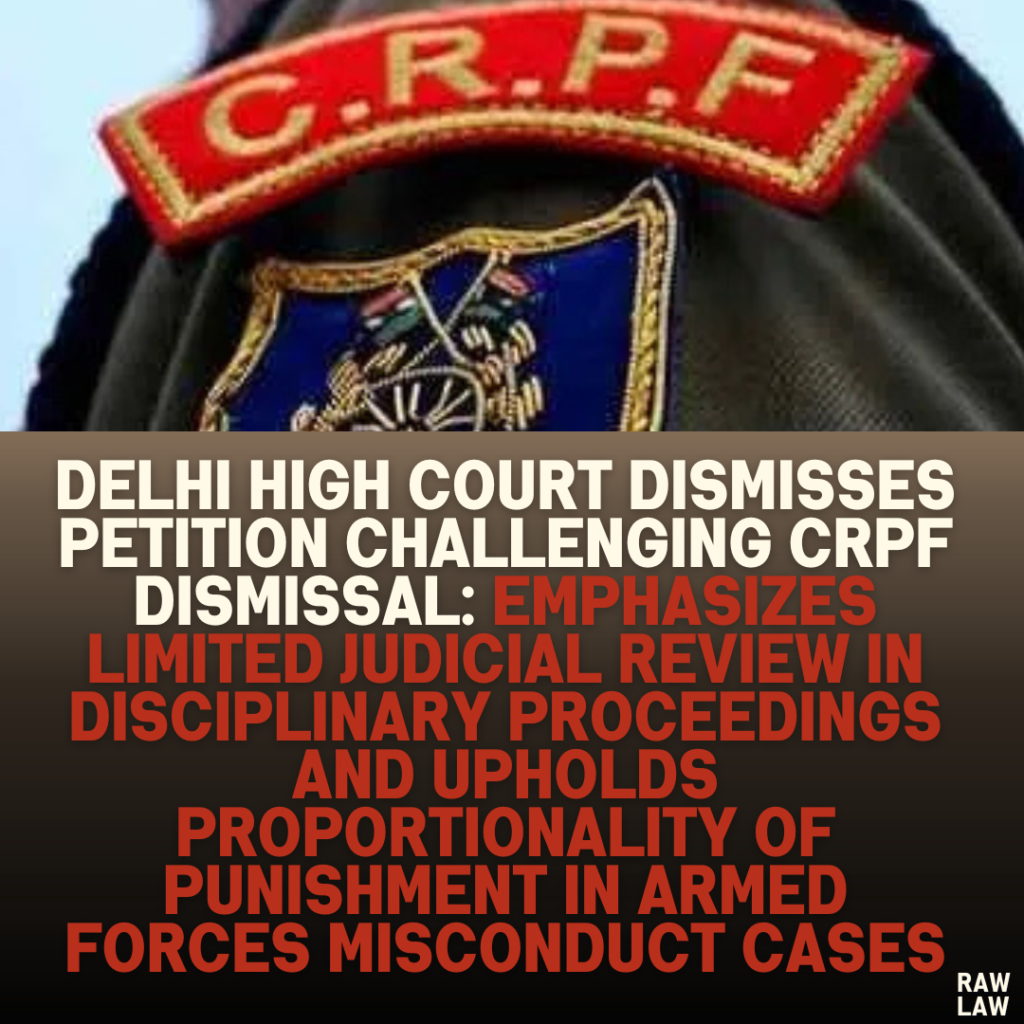Court’s Decision
The Delhi High Court dismissed the petition filed under Article 226 of the Constitution, challenging the petitioner’s dismissal from the Central Reserve Police Force (CRPF). The court held that judicial interference in departmental inquiries is limited to procedural infractions or violations of natural justice. The court found no merit in the petitioner’s case and concluded that the punishment imposed was proportionate to the misconduct.
Facts
- Petitioner’s Background: The petitioner was enlisted in the CRPF on October 11, 2013, as a constable (CT/WC). He completed training and joined his unit in March 2014.
- Leave Granted and Absence: The petitioner was granted 20 days of earned leave from November 20 to December 10, 2015. However, he failed to report to duty after the leave period, citing health reasons and family obligations.
- Medical Conditions: The petitioner claimed he suffered from severe health issues, including infective hepatitis and malaria-typhoid, which required prolonged bed rest. Additionally, his newborn daughter had a heart defect and required urgent medical care.
- Communication with Authorities: The petitioner stated that he informed the CRPF authorities of his situation via registered speed post and phone calls. However, the authorities denied receiving any communication or supporting documents.
- Disciplinary Action:
- The CRPF authorities treated the petitioner’s absence as unauthorized and initiated a Court of Inquiry (COI).
- A departmental inquiry (DE) was conducted, which the petitioner did not attend despite being notified.
- On August 22, 2016, the petitioner was dismissed from service for unauthorized absence under Section 11(1) of the CRPF Act and Rule 27 of the CRPF Rules.
- Post-Dismissal Appeals:
- The petitioner filed appeals and a revision petition, seeking reinstatement or a reduced punishment.
- These appeals were dismissed by the appellate and revisional authorities, citing lack of merit and unexplained delays.
Issues
- Whether the disciplinary proceedings violated the principles of natural justice.
- Whether the punishment of dismissal was disproportionate to the alleged misconduct.
Petitioner’s Arguments
- Health and Family Issues: The petitioner argued that his prolonged absence was not deliberate but due to genuine health issues and family emergencies.
- Communication with Authorities: The petitioner claimed he informed the authorities through letters and phone calls, but his submissions were ignored.
- Opportunity to Defend: He contended that the departmental inquiry was conducted ex-parte, denying him the chance to present evidence, such as medical certificates and his daughter’s medical records.
- Disproportionate Punishment: The petitioner asserted that the punishment of dismissal was excessively harsh, given his circumstances.
- Delay in Filing Petition: The delay in filing appeals and the writ petition was attributed to the COVID-19 pandemic and the petitioner’s misunderstanding that the matter was under consideration.
Respondent’s Arguments
- Willful Misconduct: The respondents argued that the petitioner overstayed his leave without valid reasons, undermining the discipline and integrity of the CRPF.
- Repeated Notices Ignored: The petitioner was sent multiple letters and even a warrant for his arrest, but he failed to report or respond.
- Disciplinary Proceedings: The disciplinary inquiry adhered to procedural norms, including granting the petitioner opportunities to defend himself.
- Fitness for Service: The petitioner’s prolonged absence and lack of discipline made him unfit for service in a disciplined armed force.
- No Procedural Lapse: The respondents maintained that the inquiry and punishment were lawful and proportionate to the misconduct.
Analysis of the Law
- Scope of Judicial Review:
- The court emphasized its limited role in interfering with departmental inquiries under Article 226.
- Judicial review is restricted to examining whether the inquiry violated procedural fairness, principles of natural justice, or imposed a disproportionate punishment.
- Conduct in Armed Forces:
- The court highlighted the importance of discipline in armed forces. Unauthorized absence without valid communication cannot be excused, as it undermines the operational efficiency and integrity of the force.
- Petitioner’s Non-Cooperation:
- The petitioner failed to participate in the inquiry, respond to notices, or submit documents at the appropriate stage.
- The court held that his explanations and evidence could have been assessed during the inquiry but were not submitted in a timely manner.
- Proportionality of Punishment:
- The court found the dismissal to be proportionate to the gravity of the misconduct, given the petitioner’s role in a disciplined armed force.
Court’s Reasoning
- Procedural Compliance: The disciplinary inquiry was conducted per the rules, with multiple opportunities provided to the petitioner to present his case.
- Petitioner’s Obligations: As a member of a disciplined force, the petitioner was expected to respond to notices and participate in the inquiry, which he failed to do.
- No Evidence of Malafide Intent: The court found no procedural lapses or malafide intent on the part of the authorities.
- Judicial Limitations: The court reiterated that it cannot act as an appellate authority in departmental inquiries and will not substitute its judgment for that of the disciplinary authority.
Conclusion
The court dismissed the petition, holding that the petitioner failed to establish any procedural violation or disproportionality in the punishment. The disciplinary action was lawful, and the punishment was justified.
Implications
- The judgment underscores the limited scope of judicial review in disciplinary matters, especially in cases involving armed forces.
- It reinforces the principle that discipline and compliance with procedural requirements are paramount in such organizations.
- Employees must actively participate in departmental proceedings to ensure their grievances are considered.
This case serves as a reminder of the judiciary’s deference to disciplinary authorities in cases of misconduct in armed forces.




Pingback: Bombay High Court: Writ Petition Against ₹83.18 Crore Customs Duty Demand Dismissed— "Statutory Appeal Before CESTAT Must Be Exhausted, Mere Allegation of Perversity Cannot Justify Bypassing Alternative Remedy" - Raw Law